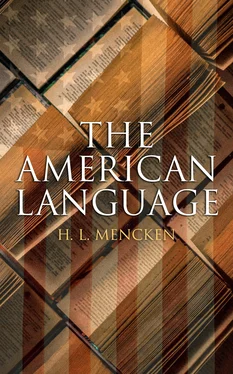H. L. Mencken - The American Language
Здесь есть возможность читать онлайн «H. L. Mencken - The American Language» — ознакомительный отрывок электронной книги совершенно бесплатно, а после прочтения отрывка купить полную версию. В некоторых случаях можно слушать аудио, скачать через торрент в формате fb2 и присутствует краткое содержание. Жанр: unrecognised, на английском языке. Описание произведения, (предисловие) а так же отзывы посетителей доступны на портале библиотеки ЛибКат.
- Название:The American Language
- Автор:
- Жанр:
- Год:неизвестен
- ISBN:нет данных
- Рейтинг книги:5 / 5. Голосов: 1
-
Избранное:Добавить в избранное
- Отзывы:
-
Ваша оценка:
- 100
- 1
- 2
- 3
- 4
- 5
The American Language: краткое содержание, описание и аннотация
Предлагаем к чтению аннотацию, описание, краткое содержание или предисловие (зависит от того, что написал сам автор книги «The American Language»). Если вы не нашли необходимую информацию о книге — напишите в комментариях, мы постараемся отыскать её.
The American Language — читать онлайн ознакомительный отрывок
Ниже представлен текст книги, разбитый по страницам. Система сохранения места последней прочитанной страницы, позволяет с удобством читать онлайн бесплатно книгу «The American Language», без необходимости каждый раз заново искать на чём Вы остановились. Поставьте закладку, и сможете в любой момент перейти на страницу, на которой закончили чтение.
Интервал:
Закладка:
Thus the American, on his linguistic side, likes to make his language as he goes along, and not all the hard work of his grammar teachers can hold the business back. A novelty loses nothing by the fact that it is a novelty; it rather gains something, and particularly if it meet the national fancy for the terse, the vivid, and, above all, the bold and imaginative. The characteristic American habit of reducing complex concepts to the starkest abbreviations was already noticeable in colonial times, and such highly typical Americanisms as O. K. , N. G. , and P. D. Q. , have been traced back to the first days of the republic. Nor are the influences that shaped these early tendencies invisible today, for the country is still in process of growth, and no settled social order has yet descended upon it. Institution-making is still going on, and so is language-making. In so modest an operation as that which has evolved bunco from buncombe and bunk from bunco there is evidence of a phenomenon which the philologist recognizes as belonging to the most primitive and lusty stages of speech. The American vulgate is not only constantly making new words, it is also deducing roots from them, and so giving proof, as Prof. Sayce says, that "the creative powers of language are even now not extinct." 44
But of more importance than its sheer inventions, if only because much more numerous, are its extensions of the vocabulary, both absolutely and in ready workableness, by the devices of rhetoric. The American, from the beginning, has been the most ardent of recorded rhetoricians. His politics bristles with pungent epithets; his whole history has been bedizened with tall talk; his fundamental institutions rest as much upon brilliant phrases as upon logical ideas. And in small things as in large he exercises continually an incomparable capacity for projecting hidden and often fantastic relationships into arresting parts of speech. Such a term as rubber-neck is almost a complete treatise on American psychology; it reveals the national habit of mind more clearly than any labored inquiry could ever reveal it. It has in it precisely the boldness and disdain of ordered forms that are so characteristically American, and it has too the grotesque humor of the country, and the delight in devastating opprobriums, and the acute feeling for the succinct and savory. The same qualities are in rough-house , water-wagon , near-silk , has-been , lame-duck and a thousand other such racy substantives, and in all the great stock of native verbs and adjectives. There is, indeed, but a shadowy boundary in these new coinages between the various parts of speech. Corral , borrowed from the Spanish, immediately becomes a verb and the father of an adjective. Bust , carved out of burst , erects itself into a noun. Bum , coming by way of an earlier bummer from the German bummler , becomes noun, adjective, verb and adverb. Verbs are fashioned out of substantives by the simple process of prefixing the preposition: to engineer , to chink , to stump , to hog . Others grow out of an intermediate adjective, as to boom . Others are made by torturing nouns with harsh affixes, as to burglarize and to itemize , or by groping for the root, as to resurrect . Yet others are changed from intransitive to transitive: a sleeping-car sleeps thirty passengers. So with the adjectives. They are made of substantives unchanged: codfish , jitney . Or by bold combinations: down-and-out , up-state , flat-footed . Or by shading down suffixes to a barbaric simplicity: scary , classy , tasty . Or by working over adverbs until they tremble on the brink between adverb and adjective: right and near are examples.
All of these processes, of course, are also to be observed in the English of England; in the days of its great Elizabethan growth they were in the lustiest possible being. They are, indeed, common to all languages; they keep language alive. But if you will put the English of today beside the American of today you will see at once how much more forcibly they are in operation in the latter than in the former. English has been arrested in its growth by its purists and grammarians. It shows no living change in structure and syntax since the days of Anne, and very little modification in either pronunciation or vocabulary. Its tendency is to conserve that which is established; to say the new thing, as nearly as possible, in the old way; to combat all that expansive gusto which made for its pliancy and resilience in the days of Shakespeare. In place of the old loose-footedness there is set up a preciosity which, in one direction, takes the form of unyielding affectations in the spoken language, and in another form shows itself in the heavy Johnsonese of current English writing—the Jargon denounced by Sir Arthur Quiller-Couch in his Cambridge lectures. This "infirmity of speech" Quiller-Couch finds "in parliamentary debates and in the newspapers"; ... "it has become the medium through which Boards of Government, County Councils, Syndicates, Committees, Commercial Firms, express the processes as well as the conclusions of their thought, and so voice the reason of their being." Distinct from journalese, the two yet overlap, "and have a knack of assimilating each other's vices." 45
American, despite the gallant efforts of the professors, has so far escaped any such suffocating formalization. We, too, of course, have our occasional practitioners of the authentic English Jargon; in the late Grover Cleveland we produced an acknowledged master of it. But in the main our faults in writing lie in precisely the opposite direction. That is to say, we incline toward a directness of statement which, at its greatest, lacks restraint and urbanity altogether, and toward a hospitality which often admits novelties for the mere sake of their novelty, and is quite uncritical of the difference between a genuine improvement in succinctness and clarity, and mere extravagant raciness. "The tendency," says one English observer, "is ... to consider the speech of any man, as any man himself, as good as any other." 46"All beauty and distinction," says another, 47"are ruthlessly sacrificed to force." Moreover, this strong revolt against conventional bonds is by no means confined to the folk-speech, nor even to the loose conversational English of the upper classes; it also gets into more studied discourse, both spoken and written. I glance through the speeches of Dr. Woodrow Wilson, surely a purist if we have one at all, and find, in a few moments, half a dozen locutions that an Englishman in like position would never dream of using, among them we must get a move on , 48 hog as a verb, 49 gum-shoe as an adjective with verbal overtones, 50 onery in place of ordinary , 51and that is going some . 52From the earliest days, indeed, English critics have found this gipsy tendency in our most careful writing. They denounced it in Marshall, Cooper, Mark Twain, Poe, Lossing, Lowell and Holmes, and even in Hawthorne and Thoreau; and it was no less academic a work than W. C. Brownell's "French Traits" which brought forth, in a London literary journal, the dictum that "the language most depressing to the cultured Englishman is the language of the cultured American." Even "educated American English," agrees the chief of modern English grammarians, "is now almost entirely independent of British influence, and differs from it considerably, though as yet not enough to make the two dialects—American English and British English—mutually unintelligible." 53
American thus shows its character in a constant experimentation, a wide hospitality to novelty, a steady reaching out for new and vivid forms. No other tongue of modern times admits foreign words and phrases more readily; none is more careless of precedents; none shows a greater fecundity and originality of fancy. It is producing new words every day, by trope, by agglutination, by the shedding of inflections, by the merging of parts of speech, and by sheer brilliance of imagination. It is full of what Bret Harte called the "sabre-cuts of Saxon"; it meets Montaigne's ideal of "a succulent and nervous speech, short and compact, not as much delicated and combed out as vehement and brusque, rather arbitrary than monotonous, not pedantic but soldierly, as Suetonius called Caesar's Latin." One pictures the common materials of English dumped into a pot, exotic flavorings added, and the bubblings assiduously and expectantly skimmed. What is old and respected is already in decay the moment it comes into contact with what is new and vivid. Let American confront a novel problem alongside English, and immediately its superior imaginativeness and resourcefulness become obvious. Movie is better than cinema ; it is not only better American, it is better English. Bill-board is better than hoarding . Office-holder is more honest, more picturesque, more thoroughly Anglo-Saxon that public-servant . Stem-winder somehow has more life in it, more fancy and vividness, than the literal keyless-watch . Turn to the terminology of railroading (itself, by the way, an Americanism): its creation fell upon the two peoples equally, but they tackled the job independently. The English, seeking a figure to denominate the wedge-shaped fender in front of a locomotive, called it a plough ; the Americans, characteristically, gave it the far more pungent name of cow-catcher . So with the casting where two rails join. The English called it a crossing-plate . The Americans, more responsive to the suggestion in its shape, called it a frog .
Читать дальшеИнтервал:
Закладка:
Похожие книги на «The American Language»
Представляем Вашему вниманию похожие книги на «The American Language» списком для выбора. Мы отобрали схожую по названию и смыслу литературу в надежде предоставить читателям больше вариантов отыскать новые, интересные, ещё непрочитанные произведения.
Обсуждение, отзывы о книге «The American Language» и просто собственные мнения читателей. Оставьте ваши комментарии, напишите, что Вы думаете о произведении, его смысле или главных героях. Укажите что конкретно понравилось, а что нет, и почему Вы так считаете.












